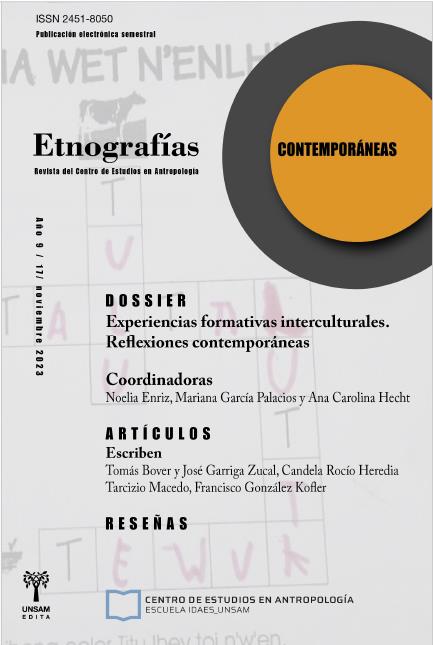Like a professional
(moving) ethnography, participation, and reflexivity in esports research in the Brazilian Amazon
Keywords:
Game studies, ethnography, communication, esports, reflexivityAbstract
Esport is an expression that has gained popularity in recent years to refer to electronic sports, a particular form of practicing competitive digital sports games mediated by computers. Its expansion into a global phenomenon with multiple local repercussions has driven the proliferation of aspiring and professional teams of players engaged in the practice in different countries, as well as mobilizing a significant number of actors involved in this process. This article contributes a retrospective reflection on the ethnography of a community of semi-professional players from the Brazilian Amazon for whom (auto)biography, participation, and the photographic camera have become not only research but also a promotional resource. Examining the transformations that researcher participation and experimentation have fostered, both in the practice of ethnographic fieldwork and in the relationship with gamers, this paper explores the central role played by (auto)biography, participation and affect in ethnographic research on digital games and esports. Finally, some of the epistemological and methodological intersections between social markers, gamer culture, and professional culture in video games are considered. Some of the implications of these aspects for recording social scientific experiences at a time when participation is increasingly popularized and also pleasurable, however polarized, and problematic.
References
Aarseth, E. (2003). Playing Research: Methodological approaches to game analysis. The Digital Arts and Culture Conference.
Apperley, T. y Jayemane, D. (2012). Game Studies Material Turn. Westminster Papers in Communication and Culture, 9(1), 5-25.
Berger, R. (2013). Now I see it, now I don't: researcher’s position and reflexivity in qualitative research. Qualitative Research, 15(2), 219-234.
Boellstorff, T. (2006). A Ludicrous Discipline? Ethnography and Game Studies. Games and Culture, 1(1), 29-35.
Boellstorff, T. (2010). Coming of Age in Second Life: An Anthropologist Explores the Virtually Human. Princeton University Press.
Boellstorff, T., Bonnie, N. y Taylor, T. (2012). Ethnography and Virtual Worlds: A Handbook of Method. Princeton University Press.
Braithwaite, A. (2016). It’s about ethics in games journalism? Gamergaters and geek masculinity. Social Media + Society, 2(4), 1-10.
Brown, A. (2015). Awkward: The importance of reflexivity in ethnographic me¬thods. Em P. Lankoski e S. Björk (Eds.), Game Research Methods: An Overview (pp. 77-92). ETC Press.
Caiafa, J. (2019). Sobre a etnografia e sua relevância no campo da comunicação. Questões Transversais. 7(14), 1-164.
Copier, M. (2007). Beyond the Magic Circle. A Network Perspective on Role-Playing Online Games. [PhD Thesis]. Universiteit Utrecht.
Chee, F. (2005). Essays on Korean online game communities. A sense of place: Media and motivation in Korea by the Wangtta effect and Order and chaos in an ethnography of Korean online game communities. [PhD Thesis in Communication]. School of Communication, Simon Fraser University.
Chee, F. (2012). Online Games as a Medium of Cultural Communication: an ethnographic study of sociotechnical transformation. [PhD Thesis in Communication]. School of Communication, Simon Fraser University.
Cusicanqui, S. (1987). El potencial epistemológico da História Oral: de la lógica instrumental a la decolonizacion de la história. Temas Sociales, 11, 49-64.
Ekdale, B. (2017). Negotiating the Researcher: Interstitial, Appropriated, and Digital Identities in Media Production Ethnography. Westminster Papers in Communication and Culture, 9(3), 7-26.
Ewing, K. (1994). Dreams from a Saint: Anthropological Atheism and the Temptation to Believe. American Anthropologist, 96(3), 571-583.
Fabian, J. (2000). Out of our minds: reason and madness in the exploration of Central Africa. University of California Press.
Fabian, J. (2001). Anthropology with an Attitude: Critical Essays. Stanford University Press.
Falcão, T. (2014). Não-humanos em Jogo. Agência e Prescrição em World of Warcraft. [Tese de doutorado em Comunicação e Culturas Contemporânea]. Faculdade de Comunicação, Universidade Federal da Bahia.
Falcão, T., Macedo, T. e Kurtz, G- (2021). Conservadorismo e masculinidade tóxica na cultura gamer: Uma aproximação a Magic: The Gathering. MATRIZes, 15(2), 251-277.
Falcão, T., Marques, D., Mussa, I. e Macedo, T. (2020). At the Edge of Utopia. Esports, Neoliberalism and the Gamer Culture’s Descent into Madness. Journal Gamevironments, 13(2), 382-419.
Favret-Saada, J. (2005). “Ser afetado”, de Jeanne Favret-Saada. Revista Cadernos de Campo. 13(13), 155-161.
Fragoso, S. (2012). Mediações espaciais da sociabilidade on-line. Em I. Oliveira e M. Marchiori (Orgs.). Redes Sociais, Comunicação, Organizações (pp. 67-84). Difusão.
Goldman, M. (2008). Os tambores do antropólogo: Antropologia pós-social e etnografia. Ponto Urbe, 2(3), 1-11.
Gómez-Cruz, E., Ricaurte, P. y Siles, Ignacio (2023). Descolonizando los métodos para estudiar la cultura digital: Una propuesta desde Latinoamérica. Cuadernos.info, (54), 160-181.
Goulet, J. (2011). Trois manières d'être sur le terrain: une brève histoire des conceptions de l'intersubjectivité. Anthropologie et Sociétés, 35(3), 107-125.
Gray, K. (2014). Race, gender, and deviance in Xbox Live: Theoretical perspectives from the virtual margins. Elsevier.
Guber, R. (2001). La etnografía: método, campo y reflexividad. Norma.
Jin, D. (2021). Global Esports: Transformation of Cultural Perceptions of Competitive Gaming. Bloomsbury Academic.
Johnson, R. (2010). The digital Illusion: Gender, work and culture in digital game production. [PhD Thesis in Mass Communications]. Graduate College, University of Iowa.
Johnson, R. (2018). Technomasculinity and its influence in video game production. Em N. Taylor e G. Voorhees (Eds.). Masculinities in play (pp. 249-262). Palgrave Macmillan.
Júnior, D. (2019). Encontros epistêmicos e a formação do pesquisador em História Oral. História Oral, 22(1), 359-372.
Klastrup, L. (2003). Towards a Poetics of Virtual Worlds: Multi-User Textuality and the Emergence of Story. [PhD Thesis in Digital Aesthetics and Communication]. Department for Digital Aesthetics and Communication, IT University of Copenhagen.
Latour, B. (1992). Where are the Missing Masses? The Sociology of a Few Mundane Artifacts. Em W. Bijker e J. Law (Eds.). Shaping Technology/Building Society: Studies in Sociotechnical Change (pp. 225-258). MIT Press.
Macedo, T. (2018). Like a Pro: Dinâmicas Sociais no e-sport. [Dissertação de mestrado em Comunicação, Cultura e Amazônia]. Instituto de Letras e Comunicação, Universidade Federal do Pará.
Macedo, T. (2023). Querelas esquecidas dos game studies: monopólio e diversidade configuracional nos esports. Galáxia, 48(1), 1-23.
Macedo, Tarcízio. e Falcão, T. (2019). E-sports, herdeiros de uma tradição. Intexto, 45(2), 246-267.
Macedo, T. e Fragoso, S. (2019). Geografias dos Esports: mediações espaciais da prática competitiva na Amazônia. Logos, 26(2), 106-123.
Macedo, T. e Kurtz, G. (2021). Quem não sonhou em ser um jogador de videogame? Colonialidade, precariedade e trabalho de esperança em Free Fire. Contracampo, 40(3), 1-23.
Malaby, T. (2009). Anthropology and Play: The Contours of Playful Experience. New Literary History, 40(1), 205-218.
Marranci, G. (2008). The Anthropology of Islam. Berg Publishers.
Martino, L. e Marques, Â. (2018). Afetividade do conhecimento na epistemologia: a subjetividade das escolhas na pesquisa em Comunicação. MATRIZes, 12(2), 217-234.
Mignolo, W. (2002). El potencial epistemológico de la historia oral: algunas contribuciones de Silvia Rivera Cusicanqui. Em D. Mato (Comps.). Estudios y otras prácticas intelectuales latinoamericanas en cultura y poder (pp. 1-16). CLACSO.
Murray, S. (2018). On video games: The visual politics of race, gender and space. I.B. Tauris.
Mussa, I., Falcão, T. e Macedo, T. (2020). Lazer liminar: colonização do jogo e trabalho do jogador no RappiGames. Antares, 12(28), 313-340.
Nardi, B. (2010). My Life as a Night Elf Priest: An Anthropological Account of “World of Warcraft. University of Michigan Press.
Pearce, C.(2011). Communities of Play: Emergent Cultures in Multiplayer Games and Virtual Worlds. MIT Press.
Peirano, M. (2014). Etnografia não é método. Horizontes Antropológicos, 20(42), 377-391.
Rappaport, A. (2020). “Melee is Broken”: Super Smash Bros. Melee: An Interdisciplinary Esports Ethnography. [MSc. Thesis]. Department of Humanities, Concordia University.
Robinson, L. (2007). The cyberself: the self-ing project goes online, symbolic interaction in the digital age. New Media & Society, 9(1), 93-110.
Roy, A. (2016). Who’s afraid of postcolonial theory? International Journal of Urban and Regional, 40(1), 200-209
Sünden, J. (2009). Play as transgression: an ethnographic approach to queer game cultures. Em Proceedings of DiGRA. London, Brunel University, pp. 1-7.
Sünden, J. e Sveningsson, M. (2012). Gender and Sexuality in Online Game Cultures: Passionate Play. Routledge.
Taylor, N. (2009). Power Play: Digital Gaming Goes Pro. 2009. [PhD Thesis in Education). Graduate Program in Education, York University.
Taylor, N. (2015). Professional Gaming. Em R. Mansell e P. Ang (Eds.). The International Encyclopedia of Digital Communication and Society (pp. 987-990). Wiley Blackwell, 2015.
Taylor, N. (2016). Play to the camera: Video ethnography, spectatorship, and e-sports. Convergence: The International Journal of Research into New Media Technologies, 22(2), 115-130.
Taylor, N. (2018). I’d rather be a cyborg than a gamerbro: How masculinity mediates research on digital play. MedieKultur, 64, 10-30.
Taylor, T. (2006). Play Between Worlds: Exploring Online Game Culture. MIT Press.
Taylor, T. (2012). Raising the Stakes: E-Sports and the Professionalization of Computer Gaming. MIT Press.
Taylor, T. (2018). Watch Me Play: Twitch and the Rise of Game Live Streaming. Princeton University Press.
Taylor, T. (2022). Ethnography as Play. American Journal of Play, 14(1), 33-57.
Thornham, H. (2011). Ethnographies of the Videogame Gender, Narrative and Praxis. Routledge.
Travancas, I. (2005). A experiência etnográfica no campo da comunicação. Em J. Duarte, e A. Barros (Orgs.). Métodos e técnicas de pesquisa em comunicação (pp. 98-109). Atlas.
Wohn, D. e Freeman, G. (2020). Live Streaming, Playing, and Money Spending Behaviors in eSports. Games and Culture, 15(1), 73-88.
























